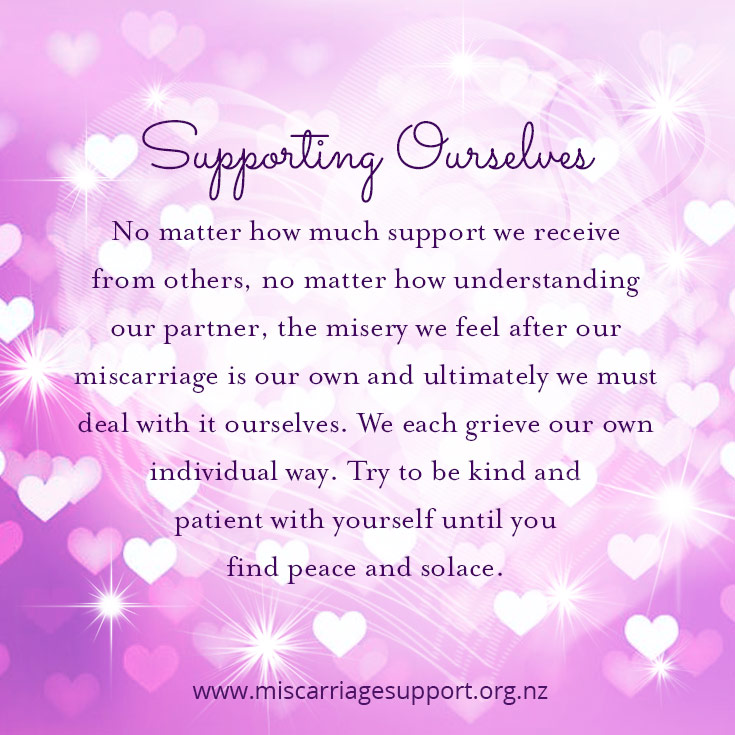Sharing the news can be one of the most painful parts of your loss, especially if; there are quite a few people involved; you were already in your second trimester; it is not your first miscarriage. Just saying the words, “I have had a miscarriage” or “I have lost my baby”, intensifies your feelings and reiterates the reality of it all over again. Personally telling close friends and relations may be hard but necessary for future relations. It is difficult to consider others’ feelings when your own are all so encompassing but do the best you can. If they live close by perhaps have someone you trust organise a get-to-gether so you can tell them all yourselves in one go. It may be that your partner could handle it better than you.
Grandparents can be particularly upset but do not necessarily show it. Understand that your feelings are more important. If you hadn’t told many people you were pregnant, it can be a blessing. However if you need their support it can be hurtful and upsetting to someone you had not shared with. They may not offer the response you were hoping for. Whatever option you chose, know that there are pitfalls in both. (You may like to direct people to our ‘Helping someone after miscarriage‘ section).
Work
At work (see ‘Helping someone at work‘) or in a group you belong to, a caring colleague could let others know that you are sorry but do not feel up to telling them yourself. Perhaps get them to pass on a message about the most supportive, comforting way to respond to you, when you return to work/meetings. (Don’t forget your boss/president.) There will always be unexpected times, even weeks later, when you will have to deal with someone not knowing you have miscarried. Think about an appropriate, easy to remember response ahead of time so that you will be prepared for their reaction and you can choose to share details or not.
 It helps healing to talk but not if it isn’t the right person. Also be prepared for the usual ‘helpful’ thoughtless remarks and understand that without the complex and confusing miscarriage experience. Others simply do not ‘get it’, and do the best they can.
It helps healing to talk but not if it isn’t the right person. Also be prepared for the usual ‘helpful’ thoughtless remarks and understand that without the complex and confusing miscarriage experience. Others simply do not ‘get it’, and do the best they can.
While we are still in shock some suggestions for healing can make sense immediately. Others resonate with us at different times and are more welcome then. Others always seem inappropriate. The first time we experience grief it can feel like we will never recover and that’s often when some of the wiser words can apply. Also our own coping mechanisms may be in a different phase at different times, particularly at the beginning of grief when there are practical decisions that have to be dealt with. This can also distract us into not having to process our feelings and extend the time we may have assumed grief would last.
Suggestions for helping ourselves
No matter how much support we receive from others, no matter how understanding our partner, the misery we feel after our miscarriage is our own. Ultimately we must deal with it ourselves. We each grieve our own individual way. Try to be kind and patient with yourself and use whatever brings you solace.
- Face life one day at a time.
- Cry, go with your feelings.
- Think of your needs, put yourself first.
- Get lots of hugs from special people.
- Do not have too many expectations of yourself by thinking this should be over by now. This will just add to your anxiety.
- Avoid making major decisions. It will compound your stress and may not be the right one.
- Indulge yourself for a while – try having a massage or do something you would not take the time to do normally.
- Ask for what you need. Others will be guessing and may not really be helpful.
- Be aware that drugs and alcohol can delay the grieving process.
- Writing is helpful, keep a journal or even write a letter to your baby.
- Do what you feel you can cope with, but know when to stop.
- It is important to eat and drink at regular intervals even if you don’t feel particularly hungry. This will keep your blood sugar stable and prevent mood swings.
- Practice some form of stress release like Yoga, meditation, self hypnosis, music or relaxation techniques.
- Try to get out of the house at least once a day.
- Try to take a few days’ break away.
- Send a letter to your friends to let them know the best way they can help you. See example
- Do not hesitate to seek professional help if you are finding it difficult.
- Above all, talk, talk, talk over the miscarriage with your partner, friends, etc.
- Be gentle with yourself. It is normal to grieve and feel sad and lonely. It is normal to think your partner and other children might die and to feel happy one moment and depressed the next. Feeling you are somehow to blame is normal. It is OK to be jealous of other pregnant women and women who don’t seem to care about their children and to feel life is not fair. The intensity of your emotions will pass. You WILL get back to a ‘new normal’.
- Eventually you may be left with lingering fear, wanting to stay in a safe place and not take risks to avoid emotional pain – retreating into yourself. However, you can also be avoiding the good things too. Pushing yourself to do something does not have to be too ambitious or risky, but it is something you need to make yourself do – a little at a time is fine as is a big splurge – whatever works for you. Otherwise you can miss out on life and take longer to heal and get back to that ‘new’ normal. You have survived. Although you may feel less secure, but that’s how life is and you know now that you can cope and take the confidence from that into the future. Although there are often unexpected sadness triggers, it does help to accept that a date coming up will be stressful and take special care of yourself on that day. Perhaps plan something around acknowledging your loss or doing something distracting but also let others know too so that they can support you.
- Understand the Crisis Ring Theory. When you are in crisis, you are in the centre of the inner ring and everyone else is in outer rings. Your closest people are in the inner rings closest to you.
The rules are. The person in the center ring can say anything she wants to anyone, anywhere. She can complain and whine and moan and curse the heavens and say, “Life is unfair” and “Why me?” That’s the one payoff for being in the center ring. Everyone else can say those things too, but only to people in larger rings.
The first rule is comfort inwards and dump outwards.
http://articles.latimes.com/2013/apr/07/opinion/la-oe-0407-silk-ring-theory-20130407 - Working with Heartbreak Guided Meditation by Sally Kempton.





